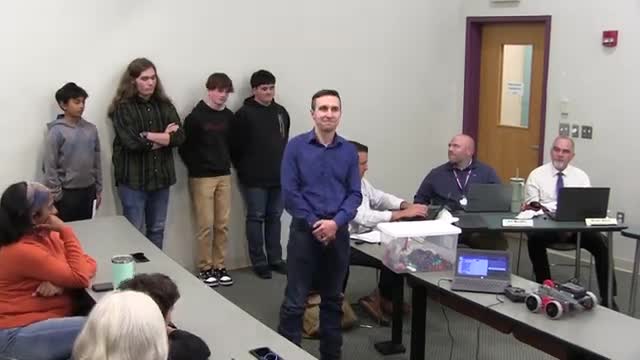North Brookfield highlights new STEM/advanced-manufacturing pathway, student projects and grant-funded equipment
Get AI-powered insights, summaries, and transcripts
Subscribe
Summary
District presented its Project Lead The Way STEM curriculum, student projects and an Advanced Manufacturing pathway that offers certifications and hands-on capstone opportunities; materials for the program were paid for with grant funding, administrators said.
The North Brookfield School Committee heard a presentation and student demonstrations of a districtwide STEM program that the district said has been phased in from elementary through high school and is supported by grant-funded equipment and curriculum.
The district described a multi-year rollout of Project Lead The Way (PLTW) curriculum and an Advanced Manufacturing pathway for grades 9–12 that, administrators said, aims to give students both exposure to engineering and industry‑recognized technical credentials.
Why it matters: The presentation framed the pathway as a strategy to expand students’ postsecondary and career options without drawing on the local operating budget. Administrators said the materials (3D printers, robotics kits and consumables) were purchased using grant funding and that the pathway aims to prepare some students for immediate employment with certifications while allowing others to pursue college-level engineering programs.
Details from the presentation and demonstrations
- Staffing and curriculum: John McNeil, identified as the district-level STEM teacher, described a continuum of courses from elementary CAD and design units through middle‑school robotics to a required freshman engineering course that serves as the district’s introduction to the Advanced Manufacturing pathway. The district said PLTW programming was phased in over several years.
- Student demonstrations and remarks: Middle- and high‑school students demonstrated robotics kits and described class work. Student speakers cited practical skills learned, including CAD, gear trains, motors and problem solving. A middle-school student, Nikaya Fitch, described beginning CAD and design work in fifth grade and continuing into sixth grade. A high‑school student, Dante (surname not provided), said the pathway helps students “become familiar with CAD through Fusion” and noted opportunities to earn credentials with sustained study.
- Equipment and donations: Presenters said the district has six 3D printers in the buildings (two in the elementary building and four in the high school), and that True Robotics donated 31 robotics kits the district will use at the elementary and middle-school levels. Administrators said additional robotics kits and robotic arms are in use or planned for higher-grade classes.
- Credentials and capstone: The presentation listed Fusion (Autodesk Fusion 360) computer‑aided‑design credentialing as one certification students can earn; staff said a pathway cohort could graduate with professional-level credentials after sustained coursework. Administrators outlined a multi‑year vision culminating in a capstone project in the next three years (presenters referenced a 2028 capstone timeline) that could include internships or on-campus manufacturing projects.
- Funding and equity: School leaders said all durable and consumable materials purchased for the pathway were paid for with grant funding to date and therefore did not come from the local operating budget. They emphasized that all freshmen are exposed to the pathway, so credentialing and advanced coursework are optional continuations.
Questions and next steps
Committee members asked for more detail on credentialing timelines and student pathways through the program. Administrators said they will continue to bring information to the committee, publicize showcases and host a “learning showcase” night for families and the community to see student work.
Ending: Administrators said they would continue pursuing grant and partnership opportunities to expand the pathway and schedule community showcases so residents can view student projects and credentialing outcomes.
